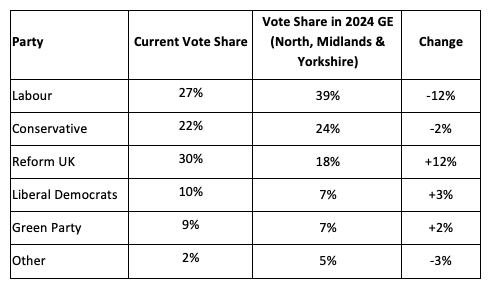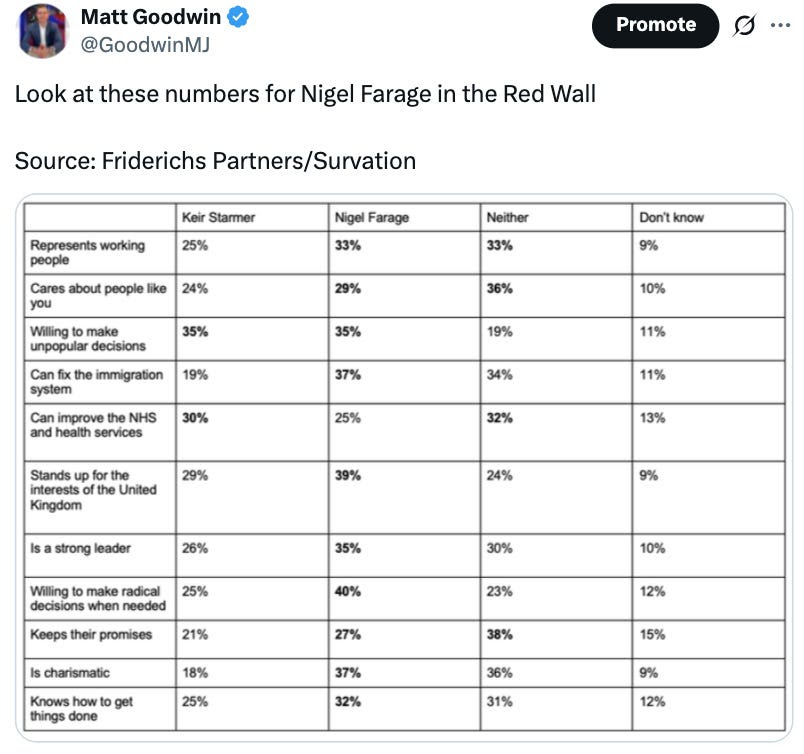EVERYWHERE you look in Europe elites are struggling or simply failing to contain national populists. In Germany, after the Alternative for Germany (AfD) was blocked from joining a governing coalition, despite finishing second at recent elections, the party just topped a national poll for the first time — a huge watershed.
In France, too, after the establishment banned Marine Le Pen from standing at the next presidential election, in 2027, her protégé, Jordan Bardella, just topped the latest polls, reflecting how, as I suggested, the use of lawfare to try to suppress national populism will inevitably backfire on an increasingly remote and insular elite.
In Austria, Sweden, Italy, the Netherlands and elsewhere, similar parties are also either governing or doing well in the polls, reflecting how, as I’ve long argued, the national populist rebellion will only get stronger so long as the ruling class refuses to address legitimate concerns over mass immigration and broken borders.
And it’s the same here in Britain where, despite the recent dispute between Nigel Farage and Rupert Lowe, Reform is still riding high.
In the latest polls, Reform is averaging 25 per cent of the national vote — more than ten points higher than it polled at the general election less than a year ago. In fact, Reform has been top or joint top in four of the last six polls.
It’s the most popular party among men, has captured one in five Tory voters, nearly half of the Brexit vote and is now, by far, the most popular party among the working class, a point Farage has leaned into by campaigning to save the steel industry.
But look closely at some brand-new polling and you’ll find a more specific and really important opportunity opening up for Reform — one that is still underestimated and downplayed by much of the political and media class in Westminster.
So, drawing on this polling, as well as our own detailed analysis of the most favourable seats for Reform, here is that golden opportunity — and why I think it’s going to become a major story in British politics over the next five years.
I am talking about the Red Wall, that swathe of territory which runs from the North East through the Midlands and Yorkshire and then Wales — this is where I think Reform will become the dominant force.
First, let’s look at that survey, released this week, by Friderichs Advisory Partners and the pollster Survation. It suggests that Reform is now leading all the other parties in the Red Wall.
Remarkably, in this more working-class and culturally conservative area of England, Reform looks set, in the words of the pollsters, ‘to cause huge disruption to the status quo’.
In fact, it suggests that in this region, since the general election last year, Keir Starmer and Labour have collapsed by 12 points, the Tories are down 2 points, while Reform has surged by 12 points, with its share of the vote in this region jumping to 30 per cent.
This means, in short, that Reform is currently the most popular party in the Red Wall — a watershed moment in British politics which underlines the party’s threat not just to Kemi Badenoch and the Tories but to Starmer and Labour too.
And it’s worth asking yourself a question — if Reform is already leading in these areas now then what will the polling look like in a few years, when the small boats are still coming, legal immigration is still soaring, the economy is still flatlining and perhaps, who knows, we are dealing with a major economic crisis?

And that’s not all.
While most voters in the Red Wall now see Farage and Reform as ‘the biggest threat’ to Labour — which is very bad news for Badenoch — they also give Farage the highest approval rating — with 36 per cent thinking positively about him compared with 27 per cent for Starmer and 26 per cent for Badenoch.
Red Wallers, furthermore, also see Nigel Farage, not the leader of the Labour Party, as the person who ‘best represents the views of working people’ — with 30 per cent thinking Farage does, compared with only 22 per cent who back Starmer.
Once again, as I’ve argued for several years now, Reform is emerging as the most popular party among the working class and inheriting the post-Brexit political realignment which the Tories squandered.
Compared with Starmer, voters in this crucial and large area also say Farage is more likely to ‘care about people like you’, ‘fix the immigration system’, ‘stand up for the interests of the UK’, “stop the small-boat crossings’, be ‘a strong leader’, is ‘willing to make radical decisions when needed’, will ‘keep his promises’, ‘knows how to get things done’, and ‘is charismatic’.

The only issue Starmer leads Farage on is the National Health Service (NHS), which explains why this has become Labour’s major line of attack against Reform.
All this, alongside the finding that Reform is also seen by the largest number of voters as the party that ‘best represents change’, should be setting off some very loud alarm bells in Downing Street.
Farage and Reform, in other words, and largely irrespective of what they do or say, are quickly becoming an outlet for millions who are desperate for radical change from the failing status quo, who strongly dislike Labour, and are seriously concerned about the dire state of the country they feel they are losing.
As this latest polling shows, Red Wallers, like countless other hardworking, tax-paying, law-abiding people, are especially sick of the spiralling cost-of-living crisis, the combined onslaught of mass uncontrolled immigration and rising number of small boats, and a Labour front bench, symbolised by Keir Starmer and Rachel Reeves, that is already deeply unpopular and still has four years to go.
Much of this, of course, will perhaps be unsurprising to longer-term members of our community. As we’ve already shown — using the most detailed analysis of Reform-friendly seats in the country — the golden opportunity for Farage and his party lies not in Tory-held seats but Labour-held ones. As we pointed out back in January: ‘It is Labour-held seats which offer a major opening to Farage and Reform at the next general election, not only Tory-held ones. In fact, of Reform’s top 100 seats, nearly two-thirds of them — 64 seats — are currently held by Labour MPs while only 22 are currently held by Tories. And of the top 50 seats for Reform — which you can see below — more than half of them, 33, are currently held by Labour MPs.
While much of the national debate is focusing on how Reform is hitting the Tories, the golden opportunity for the insurgent party, which we will begin to see reflected in results of local elections next month, will come through targeting dozens of seats held by Labour.
Seats such as Rawmarsh and Conisbrough in Yorkshire, Easington and Bishop Auckland in the North East, Cannock Chase in the West Midlands, Doncaster North, Great Grimsby, and Kingston-upon-Hull East in Yorkshire, Rhondda and Ogmore in Wales, among many more like these (the full list is here).
Seats where blue-collar, culturally conservative, and deeply patriotic voters are utterly sick and tired of the Uniparty — where workers feel they were taken for granted by Tony Blair and New Labour, were then promised the Earth but bitterly betrayed by Boris Johnson and the Tories, are now being cut adrift by Keir Starmer’s two-tier politics in favour of immigrants and minorities, and are therefore looking for any opportunity to punish the establishment and bring about the radical economic, cultural, and demographic changes they are crying out for.
They also include seats such as Labour-held Runcorn and Helsby, in the North West, where there is a crunch parliamentary by-election next month, the first of the current parliament, where Farage and Reform are looking for a breakthrough.
So, make no mistake — as this latest polling confirms, it is the forgotten, left-behind, more working-class and more culturally conservative Red Wall that represents the golden opportunity for Nigel Farage and Reform as they head toward 2029.
An area where the post-Brexit realignment of British politics is effectively on pause, where voters are desperately searching for somebody new to rally around and push through the same kind of revolt they delivered for Boris Johnson, in 2019.
Indeed, that earlier revolt is another reason why the Red Wall offers such fertile territory for Reform — because Red Wallers are already used to breaking their tribal political allegiances to endorse charismatic insurgents who promise change.
The challenge facing Nigel Farage and Reform in this area is whether they can now give these voters what they want to see. A credible message on how they will reduce the cost-of-living crisis. A reassurance they will not undermine the NHS. Strong and unequivocal opposition to mass legal and illegal migration. And very loud calls to end the two-tier politicisation of our institutions which has left millions feeling as though their leaders prioritise immigrants, minorities and law-breakers over the hardworking, tax-paying, law-abiding majority.
If Reform do all this then they will, without question, inherit the post-Brexit realignment and break through in this area in a much bigger way than many people in Westminster currently realise. This large swathe of territory is theirs for the taking. And if they take it then they will, in turn, upend British politics like never before.
This article appeared in Matt Goodwin on April 15, 2025, and is republished by kind permission.










